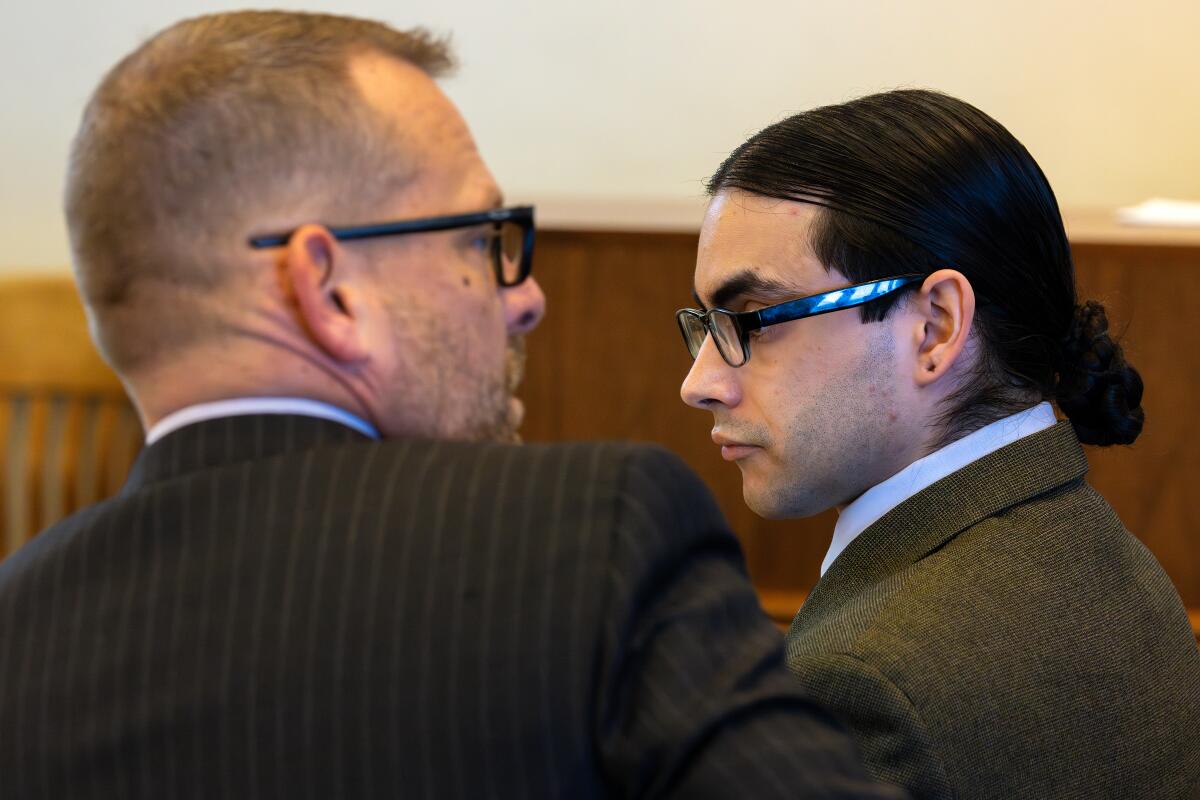Costa Mesa man convicted of murder in freeway shooting of 6-year-old

- Share via
Marcus Eriz made a habit of carrying his loaded Glock 17 when he traveled the freeways. Customized with red trim, a mag-well grip and a compensator to reduce recoil, the gun lay within easy reach in the pouch behind the driver’s seat. He wanted it with him, he would explain, because “people have been acting crazy around the freeway.”
An Orange County jury on Thursday found the Costa Mesa man guilty of second-degree murder, three years after he fired a single shot into a passing car during morning rush hour on the 55 Freeway, killing a 6-year-old boy who was strapped into a booster seat. Eriz, 26, faces 40 years to life in prison.
At his weeklong trial in Santa Ana, Eriz did not dispute that he fired the shot that killed Aiden Leos on May 21, 2021. The case came down to his degree of culpability, with his public defender arguing that he was guilty of a lesser charge of voluntary manslaughter.
Eriz was a passenger in his girlfriend Wynne Lee’s Volkwagen that morning as they crossed the 55 Freeway near Chapman Avenue, headed to work together. Joanna Cloonan was driving her son Aiden to kindergarten in her Chevrolet when Lee cut her off, and then — by Cloonan’s account — flashed a sarcastic peace sign.
Cloonan responded by flashing a middle finger at the Volkswagen as she passed. She remembered Eriz smiling at her from the passenger seat, then hearing a loud sound as she pulled away. It was a single bullet from Eriz’s gun, passing through the trunk and through her son’s body.
“As she drove away, in the most cowardly fashion, [Eriz] fired a round at her to teach her a lesson,” Deputy Dist. Atty. Daniel Feldman told jurors in his closing argument Wednesday. By his own admission to police, Eriz “wasn’t even angry” at the moment, but wanted to send the message “not to disrespect him.”
“He smiled, squeezed off that round, and went about his day,” Feldman said.
An intense 16-day manhunt ensued, with banners asking “WHO SHOT AIDEN?” hanging from freeway overpasses. A witness had snapped a blurry picture of the car, and tips poured in. When police interrogated Eriz, he said he had been carrying a gun for months as he commuted to his job at a collision repair shop.
“People have been a lot more hostile on the road lately, so I’ve always had my Glock with me,” Eriz said.
When the Chevrolet driver flipped him off, he grabbed it, racked it, opened the window and fired.
“You knew that there was a high likelihood that that kind of action would kill somebody?” an investigator asked.
“Yes, sir.”
“And you still did it?”
“Yes, sir.”
Eriz said that Cloonan had been “just hostile towards us,” but had posed no actual danger.
At trial, the prosecutor did not have to prove that Eriz meant to kill Leos, or even was aware that the boy was in the car. The second-degree murder charge hinged on the concept of “implied malice,” meaning he knew shooting the gun was life-endangering.
Far from being “some little boy who picked up his dad’s gun,” the prosecutor told jurors, Eriz passed a firearms safety course, personally installed modifications on his Glock, and practiced with the weapon.
Deputy Public Defender Randall Bethune told jurors the shooting was the “rash” choice of a young man who had acted under the provocation of the freeway confrontation, and who told police, when asked why he did it, “I have no answer why.”
The smile Eriz directed at Cloonan before the shooting was not a mask of cold indifference, Bethune said, but “a sheepish sorry-about-that” as apology for his girlfriend’s driving.
When he learned police were looking for him, Eriz hid his girlfriend’s car because he didn’t want to get her in trouble, the defense attorney said, but he did not flee. “He didn’t disappear up into the mountains of Weaverville, where he’s from,” Bethune said. “He didn’t go to Mexico. He stayed.”
The defense attorney said Eriz “feels terrible about what he’s done.” Eriz spent much of the trial, at which he declined to testify, staring straight ahead with a blank expression.
A judge will consider his sentencing at a hearing set for April 12.
More to Read
Sign up for Essential California
The most important California stories and recommendations in your inbox every morning.
You may occasionally receive promotional content from the Los Angeles Times.














